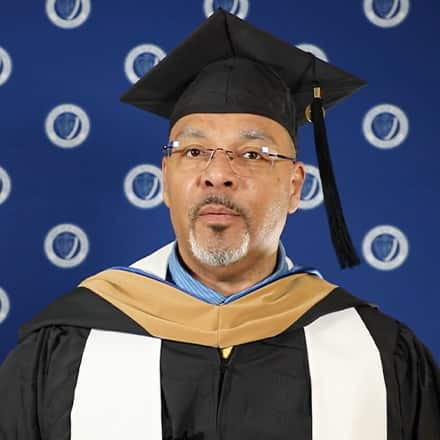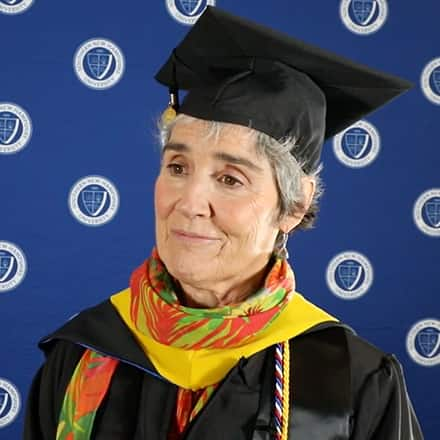
Earn an MS in Organizational Leadership
- $637/credit (36 credits total)
- Transfer up to 12 graduate credits
- Finish in just 15 months, or at your own pace
- Earn an HR certificate along the way
- $107,360 median annual salary for managers in 20221
- 24/7 access to coursework
Master’s in Organizational Leadership Program Overview
Great leaders have a common trait. They’re driven to be better leaders. Better problem solvers. Better at leading with mission and purpose. More effective at managing conflict and navigating challenging times.
The Master of Science (MS) in Organizational Leadership is a fully online degree program that prepares students to be leaders in their careers. The skills acquired in this program offer flexibility for professional growth and advancement in nearly all industries, which makes graduates with this degree in demand. The world needs more great leaders. This program is designed to cultivate them.
Whether you’re in a leadership role now or preparing to step up to one, the MS in Organizational Leadership program lays the groundwork you’ll need to succeed. You’ll learn to lead individuals, teams and organizations; become adept at setting strategic goals; manage shifts in organizational structure; and gain the expertise to move business forward in times of change. The skills and insights you’ll acquire through this program can help you master best leadership practices that can get immediately applied in the workplace.
Ben Locwin '09 already had an MBA and an established career in the biotechnology and pharmaceuticals field when he enrolled in SNHU's online master's in organizational leadership. His motivation was to “refine my personal leadership brand.”
Locwin saw the degree as “an important credential to show I had invested a significant amount of time in understanding how organizations operate.” He also saw it as a chance to get better at motivating employees to help improve company performance.
With the increased complexities of doing business in a global marketplace, leaders need to be more strategic to keep employees motivated and business running smoothly. A report from Human Resource Executive that came out amid the 2020 global pandemic shows how technology can help.2 While it focuses on times of crisis, its lessons apply to at least two key aspects of managing today’s workforce – remote workers and communications. The MS in Organizational Leadership explores the use of technology in tandem with other strategies to successfully lead teams, business units and organizations.
Workers depend on strong leaders in the best of times. In challenging times, they depend on them even more. “Each business has its own nuance, but they all boil down to the development of products and/or services,” said Locwin, “and those don't happen without people producing them. And people need good leadership they can look up to in times of ambiguity.”
SNHU’s MS in Organizational Leadership will not only help you become the kind of leader people look up to. It will help you know how to move business forward, along with your career.
For students seeking career growth with a specialized focus as a human resources professional, SNHU’s organizational leadership master’s also offers the opportunity to:
- Pursue certification from the Society for Human Resource Management (SHRM)
- Pursue certification from the HR Certification Institute (HRCI®)
- Earn a graduate certificate in human resource management in conjunction with your degree program

What You'll Learn
- Organizational behavior analysis
- Strong leadership skills
- Stakeholder management
- Conflict resolution
- Performance strategies
How You'll Learn
At SNHU, you'll get support from day 1 to graduation and beyond. And with no set class times, 24/7 access to the online classroom and helpful learning resources along the way, you'll have everything you need to reach your goals.
Career Outlook
Better pay. Career growth. Upskilling. New to management or leadership. Professional development.
Those are just a few of the reasons students enroll in our master’s in organizational leadership program. Whatever your motivation, you’ll be making a worthwhile investment in your future.
Job Growth
According to the U.S. Bureau of Labor Statistics, career opportunities for management occupations are projected to grow faster than the average for all occupations through 2032. 1
Salary
The median annual salary was $107,360 for management occupations in 2022.1
Understanding the Numbers
When reviewing job growth and salary information, it’s important to remember that actual numbers can vary due to many different factors — like years of experience in the role, industry of employment, geographic location, worker skill and economic conditions. Cited projections do not guarantee actual salary or job growth.
In the face of ever-evolving market forces, organizations industrywide support the development of leadership skills in all their employees.

Demand for strong, effective leadership remains steady, especially for those with a master’s degree. The U.S. Bureau of Labor Statistics (BLS) projects 6% job growth for training and development managers through 2032, with a median annual salary of $120,000 in 2022.1 Similarly, BLS projects 5% growth for human resources managers, with median wages of $130,000 in 2022.1
While these roles represent only a fraction of those in demand, they involve responsibilities common to leadership positions across nearly every industry. According to BLS,1 both training and development managers and human resources managers:
- Plan, direct and coordinate critical organizational functions and staff
- Develop and oversee essential programs and teams
- Review and recommend programs from outside vendors
- Train or consult with other managers, specialists and support staff
- Align programs with the organization’s strategic goals
What makes an organizational leader different from, say, a department manager?

“If your goal is to influence people and impact the organization at the highest level possible, then you want to learn about organizational leadership,” said Deborah Gogliettino, SNHU’s associate dean for human resources.

"This degree has opened opportunities within my current organization," she said. "While in class, I was able to apply knowledge immediately. I would corollate my studies into my day-to-day job, which is what this program is all about: real-world situations put into action!"
Gogliettino believes the job and career prospects in organizational leadership are “constant and long-term."
“There is always going to be a need for skilled organizational leaders – today, tomorrow, and afterward,” she said.
Where Could You Work?
Human Resources
Plan, coordinate and direct the administrative functions of an organization, in addition to overseeing the recruiting, interviewing and hiring of new staff.
Marketing
Plan programs to generate interest in products or services, collaborating with art directors, advertising sales agents and financial staff members along the way.
Healthcare
Plan, direct, and coordinate medical and health services, adapting as needed to changes in healthcare laws, regulations and technology.
Nonprofits
Coordinate and supervise programs that support public well-being, in addition to directing workers who provide these services to the public.
Education
Oversee operations, coordinate curriculums, manage staff and provide a safe and productive learning environment for students.
Manufacturing
Supervise the operations of manufacturing, as well as coordinate, plan and direct activities involved in creating a range of goods.
Message from the Organizational Leadership Department Chairwoman
Thank you for your interest in Southern New Hampshire University’s Master of Science in Organizational Leadership program.
Leadership skills are vital for all members of an organization, from top-level executives to individual contributors. Organizations of all types need effective leaders and continue to invest in developing and supporting leadership skills.
By pursuing the MS in Organizational Leadership, you'll be making a lifelong investment in your own professional growth. You’ll develop skills in leadership, communication, problem solving and teamwork – fundamental job skills sought after by employers in every industry. You’ll have the opportunity to examine and evaluate business and societal trends through historical, political, economic, financial, social and cultural lenses.
As you move through the program, you’ll be able to make recommendations for optimizing all aspects of an organization, while ensuring an environment of shared values, attitudes and respect for all stakeholders. Finally, you’ll get to devise and recommend change management strategies and applications to real-world problems, as well as develop corporate social responsibility policies and practices for immediate implementation.

If you have questions or need more information, please contact a representative directly at 888.327.SNHU or enroll@snhu.edu. If you’re ready to move ahead, feel free to apply now.
Sincerely,
Jennifer Varney, PhD
Senior Associate Dean, Global Campus Business Programs
Christopher McGinnis

Christopher McGinnis ‘23G said studying online helped him find success while working from home and raising his family.
“I work from home and have a family of four with a very active schedule, and being able to study and earn my degree online made it possible,” said McGinnis said.
Start Your Journey Toward an Online Organizational Leadership Degree
Why SNHU for Your Master's in Organizational Leadership
Flexible
With no set class meeting times, you can learn on your schedule and access online course materials 24/7.
Affordable
As part of our mission to make higher education more accessible, we’re committed to keeping our tuition rates low. In fact, we offer some of the lowest online tuition rates in the nation.
Prior coursework and work experience could also help you save time and money. SNHU’s transfer policy allows you to transfer up to 12 credits from your previous institution. You could also earn college credit for previous work experience.
Respected
Founded in 1932, Southern New Hampshire University is a private, nonprofit institution with over 160,000 graduates across the country. SNHU is accredited by the New England Commission of Higher Education (NECHE), a regional accreditor, which advocates for institutional improvement and public assurance of quality.
Recently, SNHU has been nationally recognized for leading the way toward more innovative, affordable and achievable education:
- “Most Innovative” regional university honors from U.S. News & World Report each year since 2015
- A $1 million grant from Google.org to explore soft skills assessments for high-need youth
- Recognition as a 2017 Digital Learning Innovator by the Online Learning Consortium
Network
At Southern New Hampshire University, you'll have access to a powerful network of more than 300,000 students, alumni and staff that can help support you long after graduation. Our instructors offer relevant, real-world expertise to help you understand and navigate the field. Plus, with our growing, nationwide alumni network, you'll have the potential to tap into a number of internship and career opportunities.
93.6% of online students would recommend SNHU (according to a 2022 survey with 17,000+ respondents). Discover why SNHU may be right for you.
Admission Requirements
Expanding access to quality higher education means removing the barriers that may stand between you and your degree. That’s why you can apply at any time and get a decision within days of submitting all required materials:
- Completed free application
- Undergraduate transcripts, which we can retrieve for you by submitting a transcript request form
Acceptance decisions are made on a rolling basis throughout the year for our 5 graduate terms.
How to Apply
If you’re ready to apply, follow these simple steps to get the process going:
- Complete free graduate application
- Submit undergraduate transcripts
- Work with an admission counselor to explore financial options and walk through application process

Get the Skills You Need
Sam Mahra ’09G
“My organizational leadership degree gave me a better understanding of how to lead an effective organization. It also helped me understand how to motivate individuals and apply that to a group setting.”
Courses & Curriculum
Whether you aspire to be an HR manager, a nonprofit administrator, a corporate manager or a small business owner, the master’s in organizational leadership was designed with your goals in mind.
“The MS in Organizational Leadership provides an opportunity to examine leadership, change management and corporate social responsibility from a theoretic and practical perspective,” said Dr. Jennifer Varney, senior associate dean of SNHU’s business programs.
SNHU’s program offers a balanced blend of theory and practice. You’ll study theories about motivation, strategy and leadership, and then put them into practice. In the process, you’ll gain all the rewards of developing a valuable new skill set, without the risks of real-world learning experiences.


"There were quite a few classes where I was immediately able to transfer my learning into the workplace, which helped me immensely," she said.
She especially enjoyed her Leading Change class.
"In my former role, we were implementing a new HRIS (human resources information system), and my role was to lead the change management part of the project along with the training part," she said. "Thank goodness I had learned about Kotter’s 8 Step Change Model, or I would have floundered."

"At first, I did not think I would necessarily need or want to learn more about negotiations, but it was not about money," she said. "It was about getting things done and ensuring that you are constantly working with customers/peers/partners/colleagues to make things happen – which is what I do all day at work. The coursework in this class forced me outside of my comfort zone, but I was constantly having these a-ha moments at home and work when I realized what I was learning was immediately impacting the work I was doing."
As a master’s in leadership candidate, you’ll acquire the essential skills and mindsets of organizational leadership, including:
- Problem-solving and decision-making
- Communicating (and listening) effectively
- Learning from a diversity of perspectives
- Relationship- and team-building
- Developing leadership potential in others
- Identifying future innovations and opportunities
- Understanding your business environment
- Conducting business with integrity and ethics
- Thinking strategically and holistically
- Spreading the organization’s vision
The curriculum for SNHU’s 12-course (36-credit) online master’s in organizational leadership includes:
- 6 core leadership courses
- 3 leadership electives
- 3 business electives, enabling you to select courses in your areas of interest
For those seeking career growth to a specialized focus as a human resources professional, the program also offers the opportunity to:
- Receive certification from the Society for Human Resource Management (SHRM)
- Receive certification from the HR Certification Institute (HRCI®)
- Earn a graduate certificate in human resource management
SNHU’s online master’s degree in leadership features these 6 core courses:
- Human Behavior in Organizations. Look at theories of motivation, communication, leadership, power and change relative to contemporary issues. Identify organizational issues, conduct a root cause analysis from a human behavior perspective and determine targeted solutions that create positive sustainable change.
- Strategic Human Resource Management. Examine HR functions and state and federal regulatory requirements. Analyze the strategic role of the HR manager in terms of recruitment, hiring, training, career development and more. Aligned to the globally recognized Society of Human Resource Management (SHRM) Body of Competency & Knowledge Model (BoCK).
- Leading Change. Discover the various techniques and strategies used to effect systematic change and transform organizations. Coursework integrates Kotter's processes for leading change, organizational development and transformation theory and practice.
- Organizational Leadership. Learn traditional and contemporary leadership theories and apply them to the analysis of the behavior of business managers, entrepreneurs and other recognized individuals. The course includes readings, cases, exercises and numerous examples of effective leadership models.
- Responsible Corporate Leadership. Investigate the nature of the environments in which enterprises conduct their operations to determine the actual and desirable levels of business managers’ attentiveness and responsiveness to the relationship between the enterprise and society.
- Organizational Leadership Capstone. The culminating experience for the program, the capstone will assess your ability to synthesize and integrate the knowledge and skills developed throughout your coursework. Prior course assignments scaffold to the final project, so you learn sequential order of analysis techniques that transfer to real-life situations in any organization or industry.
Sam Mahra ’09G identified with topics around responsible corporate leadership. “I truly enjoyed the social science and corporate social responsibility aspects of the program,” Mahra said.
That's not the only aspect that students are thankful for.

"SNHU selects instructors who have a wealth of knowledge," said Nathalie Ojeda '21G. "They helped create conversation between peers, which helped us get a better understanding of material.... Instructors are very supportive, provide feedback and encouragement, and are available throughout the week."

"The instructors provided personal and professional experiences that were important to seeing and understanding the real-world applications of each course," he said. "Each instructor was knowledgeable and provided their own personal touch. They were challenging, supportive, knowledgeable, caring and provided communication that was necessary for me achieving my goal of attaining my degree."
What matters to you? What makes you want to be a better leader? Gain the skills and credentials you need to move your career and your organization forward with SNHU's master's in leadership online.
Linda Ellington

Dr. Linda Ellington spent 23 years in business before transition to online education. She said being accessible to her students is how she forms connections with them.
“Connect with them on a human-to-human level. I always say to my students, ‘We are all in this together.’”
Minimum Hardware Requirements
|
Component Type |
PC (Windows OS) |
Apple (Mac OS) |
|---|---|---|
|
Operating System |
Currently supported operating system from Microsoft. |
Currently supported operating system from Apple. |
|
Memory (RAM) |
8GB or higher |
8GB or higher |
|
Hard Drive |
100GB or higher |
100GB or higher |
|
Antivirus Software |
Required for campus students. Strongly recommended for online students. |
Required for campus students. Strongly recommended for online students. |
|
SNHU Purchase Programs |
||
|
Internet/ Bandwidth |
5 Mbps Download, 1 Mbps Upload and less than 100 ms Latency |
5 Mbps Download, 1 Mbps Upload and less than 100 ms Latency |
Notes:
- Laptop or desktop? Whichever you choose depends on your personal preference and work style, though laptops tend to offer more flexibility.
- Note: Chromebooks (Chrome OS) and iPads (iOS) do not meet the minimum requirements for coursework at SNHU. These offer limited functionality and do not work with some course technologies. They are not acceptable as the only device you use for coursework. While these devices are convenient and may be used for some course functions, they cannot be your primary device. SNHU does, however, have an affordable laptop option that it recommends: Dell Latitude 3301 with Windows 10.
- Office 365 Pro Plus is available free of charge to all SNHU students and faculty. The Office suite will remain free while you are a student at SNHU. Upon graduation you may convert to a paid subscription if you wish. Terms subject to change at Microsoft's discretion. Review system requirements for Microsoft 365 plans for business, education and government.
- Antivirus software: Check with your ISP as they may offer antivirus software free of charge to subscribers.
| View Full Curriculum in the Catalog |
|---|
| MS in Organizational Leadership |
| Courses May Include | ||
|---|---|---|
| MS in Organizational Leadership Online | ||
| OL 500 | Human Behavior in Organizations | This course is a study of individuals and groups and their interaction. Students examine theories of motivation, communication, leadership, power and change with practical relation to contemporary issues. They also study organizations for key design variables and reward systems aimed at improved performance and organizational efficiency through employee motivational programs, participative management and cooperative decision making. |
| OL 600 | Strategic Human Resource Management | Examine key regulatory procedures and human resource requirements as they relate to applications in organizations. Analyze the strategic role of the human resource manager in performing functions of recruitment, hiring, training, career development and other contemporary processes within the organizational setting. Study concepts aligned with the Society for Human Resource Management (SHRM) Body of Competency and Knowledge (BoCK). |
| OL 663 | Leading Change | This course focuses on transforming organizations by introducing Kotter's eight processes by which leaders effect change. Because organizations, leaders, and employees differ, various techniques and strategies are examined. The course integrates Kotter's processes for leading change, organizational development and transformation theory and practice, and analysis of an organization which has effected systematic change. The use of work teams as a key change factor will have special emphasis. |
| OL 670 | Organizational Leadership | This course combines theory and practice by encouraging students to learn traditional and contemporary leadership theories and apply them to the analysis of the behavior of business managers, entrepreneurs and other recognized individuals. This course includes readings, cases, exercises and numerous examples of effective leadership models. Areas covered include the societal evolution of leadership; the leadership roles of strategy, vision and transformational change; the development of leaders; the leadership responsibilities of creating effective teams, organizations and cultures; the exploration of different leadership styles; and current popular approaches to leadership theory. |
| OL 690 | Responsible Corporate Leadership | Students investigate the nature of the environments in which business enterprises conduct their operations in order to determine the actual and desirable levels of attentiveness and responsiveness of business managers to the relationship between the enterprise and society. |
| OL 750 | Organizational Leadership Capstone | This capstone course is the culminating experience for the M.S. in Organizational Leadership program. The aim of the capstone is to assess students' ability to synthesize and integrate the knowledge and skills they have developed throughout their coursework, rather than introducing new concepts. This course is structured to support student success in fulfilling program requirements. |
| Total Credits: 36 | ||
University Accreditation
Southern New Hampshire University is a private, nonprofit institution accredited by the New England Commission of Higher Education (NECHE) as well as several other accrediting bodies.
This program and its concentrations are accredited by the Accreditation Council for Business Schools and Programs (ACBSP). Student achievement data can be found on College Navigator.


Tuition & Fees
Tuition rates for SNHU's online degree programs are among the lowest in the nation. We offer a 25% tuition discount for U.S. service members, both full and part time, and the spouses of those on active duty.
| Online Graduate Programs | Per Course | Per Credit Hour | Annual Cost for 15 credits |
|---|---|---|---|
| Degree/Certificates | $1,911 | $637 | $9,555 |
|
Degree/Certificates (U.S. service members, both full and part time, and the spouses of those on active duty)* |
$1,410 | $470 | $7,050 |
Tuition rates are subject to change and are reviewed annually.
*Note: students receiving this rate are not eligible for additional discounts.
Additional Costs:
Course Materials ($ varies by course). Foundational courses may be required based on your undergraduate course history, which may result in additional cost.
Frequently Asked Questions
What is organizational leadership?
Organizational leadership is a management approach in which leaders help set strategic goals for the organization while motivating staff to successfully achieve those goals. Think of organizational leadership as having two fundamental components – the organization and the leader.
What makes an organizational leader different from, say, a department manager?
Organizational leaders understand the business, for one.
Organizational leaders know business and their unique role. Dr. Linda Ellington, SNHU faculty lead for the organizational leadership master’s and bachelor’s programs, said they need to look ahead and be able to envision the organization’s future. They need to have integrity and ethics. They also need to be able to lead large initiatives.

That describes Nathalie Ojeda '21G well.
"I have always been passionate about helping others," she said. "I challenge myself to make sure I create a positive change in anything I do or create support for someone else. ... (This program) allows students to focus on creating leaders in today’s world by focusing on communication and growth while teaching how to overcome change and adversity in a fast-paced environment."
Why is organizational leadership important?
Organizational leaders bring a lot to a business. They help maintain structure. They create clear roles and responsibilities. They foster leadership within their teams. They set the bar for performance and promote organizational best practices. They use their vision and problem-solving skills to tackle short-term and long-term strategic challenges.
Dr. Linda Ellington, SNHU faculty lead for the organizational leadership master’s and bachelor’s programs, describes the importance of organizational leadership this way: “An OL has the ability to look wider and deeper and to bring an advanced skill set to a company’s decision-making and strategic thinking.”
Deborah Gogliettino, SNHU’s associate dean for human resources, points out that organizational leaders can take the form of everything from an HR manager to a small business owner. Essentially, she said, it all boils down to one fundamental question: “Does this job or position help the organization move forward?”
That's all Willie Wingfield '21 wants to do with his career.
"My MS degree has prepared me to understand and drive change in my current role, as well as appreciate the steps necessary to gain support to create momentum for change," he said. "The degree has created opportunities for me to achieve my current role that supports change and talent development."
Is a master's in organizational leadership a good degree?
It’s a great degree! It’s not only practical and versatile. It also builds a skill set every organization needs.

As organizations in every industry try to navigate turbulent times, the need for effective leaders at every level continues to grow. Experts in organizational leadership can play a pivotal role in managing change. They can also help implement internal leadership development programs. The skills and insights you’ll acquire through the master’s in leadership will help you take on these critical roles.

Warner believes it’s essential for everyone in business to re-skill themselves through lifelong learning. “My advice to students is to be curious, listen, observe, keep an open mind and never stop loving to learn something new,” he said.
Those are just a few of the hallmarks of great leaders that the master’s in organizational leadership helps cultivate.
Is a master's in organizational leadership worth it?
Definitely! The master’s in leadership is a highly versatile degree. It’s also adaptable to your specific areas of interest, whether that’s in human resources, nonprofit administration or another specialty.
Sam Mahra ’09G says his organizational leadership master’s helped him appreciate the role of leadership in helping organizations be more effective. He came away knowing how to motivate people, particularly in group settings.
What’s more, demand for strong, effective leadership remains steady across every industry, especially for those with a master’s degree. The U.S. Bureau of Labor Statistics (BLS) projects 6% job growth for training and development managers through 2032, with a median annual salary of $120,000 in 2022.1 Similarly, BLS projects 5% growth for human resources managers, with a median wage of $130,000 in 2022.1
Deborah Gogliettino, SNHU’s associate dean for human resources, believes skilled organizational leaders will always be in demand. “Organizations will always embrace someone who can bring a vision, especially one of growth and sustainability," she said.
Melissa Tilton '14 '21G knows earning her OL degree was worth it.
"The program has me looking at things differently, critically thinking about actions I take before I take them, and also giving me the confidence to do things differently," she said. "As a leader, I know I have more tools in my toolbox to support my team… I can do better for them because of my SNHU education."
What can you do with a master's in organizational leadership?
Organizational leaders are CEOs, political party leaders, school superintendents, department heads, human resources managers, training and development managers – the list goes on and on.
"What is great about the MS in Organizational Leadership program is its versatility," said Dr. Christina Dumeng, associate dean at Southern New Hampshire University. "For example, whether you want to be in a leadership position, are new to leadership or have extensive leadership experience, this program is designed to serve all levels of one’s profession."
Whether you work in healthcare, technology, education, construction, manufacturing, retail or any other industry, organizational leaders are vital to an organization’s performance. These are just a few of an organizational leader’s main responsibilities:
- Plan, direct and coordinate critical organizational functions and staff
- Develop and oversee essential programs and teams
- Review and recommend programs from outside vendors
- Train or consult with other managers, specialists and support staff
- Align programs with the organization’s strategic goals
The knowledge that Debra Crombie '21 learned in her courses helped her make a successful career jump.
"During the pandemic, my role as VP of Talent Development was eliminated," she said. "Because of my degree, I had the confidence to start my own training company and used the tools I learned in my Entrepreneurship and Small Business Management class to write a business plan to get that ball rolling.... I am not sure I would have had the right tools to start my own business and would have been stuck waiting for the right full-time gig at another company."
What jobs can you get with a leadership degree?
The master’s in organizational leadership prepares you for a wide variety of roles, including:
- Operations manager
- Human resources manager
- Training and development manager
- Consultant
If you’re looking to move up to a management role, this degree can help build a valuable set of skills and knowledge. The same goes for mid-management employees seeking to advance to senior leadership levels.
Related Articles

SNHU Spotlight: Jeffrey Harris, MBA Grad

SNHU Spotlight: Luis Polanco, BS in Business Administration Grad

SNHU Spotlight: Lynda Jarrett, BS in Business Administration Grad
References
Sources & Citations (1, 2, 3)
1Bureau of Labor Statistics, U.S. Department of Labor, Occupational Outlook Handbook, on the internet at:
- https://www.bls.gov/ooh/management/home.htm (viewed Nov. 9, 2023)
- https://www.bls.gov/ooh/management/training-and-development-managers.htm (viewed Nov. 9, 2023)
- https://www.bls.gov/ooh/management/human-resources-managers.htm (viewed Nov. 9, 2023)
Cited projections may not reflect local or short-term economic or job conditions and do not guarantee actual job growth.
2Human Resource Executive, “Tech tools in the age of COVID-19,” on the internet, at https://hrexecutive.com/tech-tools-in-the-age-of-covid-19/ (viewed Sept. 9, 2021).
3World Economic Forum, “The Future of Jobs Report 2020,” on the internet, at http://www3.weforum.org/docs/WEF_Future_of_Jobs_2020.pdf (viewed Sept. 9, 2021).

